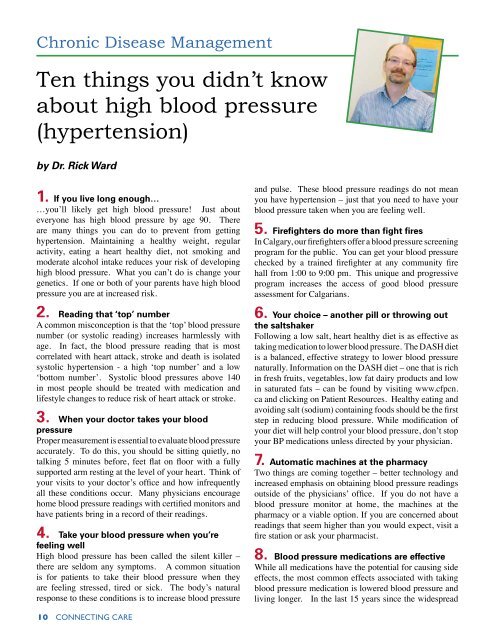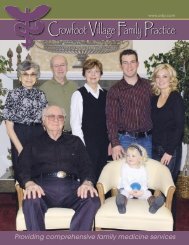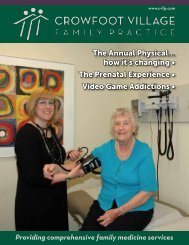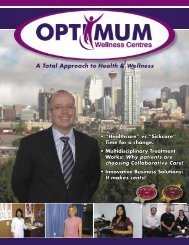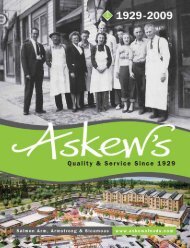Connecting Care - Calgary Foothills Primary Care Network
Connecting Care - Calgary Foothills Primary Care Network
Connecting Care - Calgary Foothills Primary Care Network
You also want an ePaper? Increase the reach of your titles
YUMPU automatically turns print PDFs into web optimized ePapers that Google loves.
Chronic Disease Management<br />
Ten things you didn’t know<br />
about high blood pressure<br />
(hypertension)<br />
by Dr. Rick Ward<br />
1. If you live long enough…<br />
…you’ll likely get high blood pressure!<br />
Just about<br />
everyone has high blood pressure by age 90. There<br />
are many things you can do to prevent from getting<br />
hypertension. Maintaining a healthy weight, regular<br />
activity, eating a heart healthy diet, not smoking and<br />
moderate alcohol intake reduces your risk of developing<br />
high blood pressure. What you can’t do is change your<br />
genetics. If one or both of your parents have high blood<br />
pressure you are at increased risk.<br />
2. Reading that ‘top’ number<br />
A common misconception is that the ‘top’ blood pressure<br />
number (or systolic reading) increases harmlessly with<br />
age. In fact, the blood pressure reading that is most<br />
correlated with heart attack, stroke and death is isolated<br />
systolic hypertension - a high ‘top number’ and a low<br />
‘bottom number’. Systolic blood pressures above 140<br />
in most people should be treated with medication and<br />
lifestyle changes to reduce risk of heart attack or stroke.<br />
3. When your doctor takes your blood<br />
pressure<br />
Proper measurement is essential to evaluate blood pressure<br />
accurately. To do this, you should be sitting quietly, no<br />
talking 5 minutes before, feet flat on floor with a fully<br />
supported arm resting at the level of your heart. Think of<br />
your visits to your doctor’s office and how infrequently<br />
all these conditions occur. Many physicians encourage<br />
home blood pressure readings with certified monitors and<br />
have patients bring in a record of their readings.<br />
4. Take your blood pressure when you’re<br />
feeling well<br />
High blood pressure has been called the silent killer –<br />
there are seldom any symptoms. A common situation<br />
is for patients to take their blood pressure when they<br />
are feeling stressed, tired or sick. The body’s natural<br />
response to these conditions is to increase blood pressure<br />
and pulse. These blood pressure readings do not mean<br />
you have hypertension – just that you need to have your<br />
blood pressure taken when you are feeling well.<br />
5. Firefighters do more than fight fires<br />
In <strong>Calgary</strong>, our firefighters offer a blood pressure screening<br />
program for the public. You can get your blood pressure<br />
checked by a trained firefighter at any community fire<br />
hall from 1:00 to 9:00 pm. This unique and progressive<br />
program increases the access of good blood pressure<br />
assessment for Calgarians.<br />
6. Your choice – another pill or throwing out<br />
the saltshaker<br />
Following a low salt, heart healthy diet is as effective as<br />
taking medication to lower blood pressure. The DASH diet<br />
is a balanced, effective strategy to lower blood pressure<br />
naturally. Information on the DASH diet – one that is rich<br />
in fresh fruits, vegetables, low fat dairy products and low<br />
in saturated fats – can be found by visiting www.cfpcn.<br />
ca and clicking on Patient Resources. Healthy eating and<br />
avoiding salt (sodium) containing foods should be the first<br />
step in reducing blood pressure. While modification of<br />
your diet will help control your blood pressure, don’t stop<br />
your BP medications unless directed by your physician.<br />
7. Automatic machines at the pharmacy<br />
Two things are coming together – better technology and<br />
increased emphasis on obtaining blood pressure readings<br />
outside of the physicians’ office. If you do not have a<br />
blood pressure monitor at home, the machines at the<br />
pharmacy or a viable option. If you are concerned about<br />
readings that seem higher than you would expect, visit a<br />
fire station or ask your pharmacist.<br />
8. Blood pressure medications are effective<br />
While all medications have the potential for causing side<br />
effects, the most common effects associated with taking<br />
blood pressure medication is lowered blood pressure and<br />
living longer. In the last 15 years since the widespread<br />
10 <strong>Connecting</strong> <strong>Care</strong>


